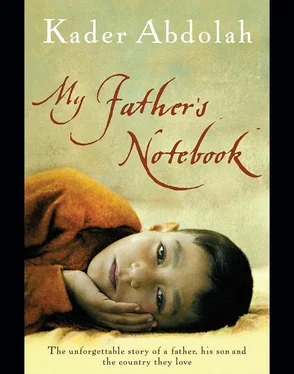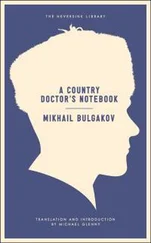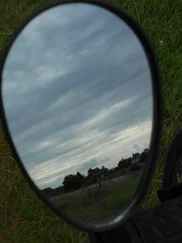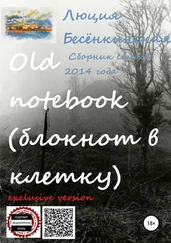Now that I’m working on his notebook, I can see that his life consisted of several phases. We’ve now landed in the book phase, which lasted for almost two years.
“Where do you get those books?” I once asked him.
“I buy them,” he said.
“You shouldn’t do that. You can’t buy just any old book. If I need a book, I’ll buy it myself.”
He didn’t listen to me and went on buying more and more books. One night Tina cried so long and hard that she fainted.
“Are you happy now?” I shouted at him. “Why can’t you listen?” It didn’t help.
Meanwhile the boys in our neighbourhood had discovered a new game. As soon as they saw my father coming home with a couple of books under his arm or in his coat pocket, they crept up behind him, snatched one of his books and ran off. He chased after them but the boys just tossed it back and forth.
The turning point came when he arrived home with torn trousers and a stack of mud-splattered books.
“What’s this?” I asked angrily.
“Nothing. Those boys in our street,” he signed and smiled.
“I don’t want any more books,” I screamed.
“No? No more books?”
I yanked one of the books out from under his arm and threw it against the wall.
“No books! You understand that? No more books!”
Afterwards I realised that I’d done a very mean and ugly thing. How old had I been at the time — twelve or thirteen? And yet I felt as if I were sixteen or seventeen, because in those two years I’d suddenly grown more than the other boys my age.
Then I did something even meaner. My father leaned over to pick up the book, but I beat him to it. I snatched it up and threw it and the rest of the books onto the roof, one by one. “Finished!” I signed angrily. “They’re all gone! Now go inside!”
My father didn’t say a word. He went inside and went to bed. (Oh, what a terrible, awful thing for me to do!)
That evening I felt like crying, but I couldn’t. How could I make it up to him? What could I possibly do?
After a while, I had a flash of insight. I finally realised why he bought those books. I lit an oil lamp and woke him up.
“Come with me!” I signed.
“Where to?”
“Up onto the roof!”
At first he thought there was a full moon, that he’d forgotten. He looked out of the window, but no, there was a new moon.
I was his Ishmael, he had to listen to me, so he got up and followed me.
With the oil lamp in one hand, I climbed the ladder.
“You, too! Climb up here!”
My father hesitantly climbed up onto the roof.
I handed him the oil lamp and started collecting the scattered books.
“Give me the lamp and come over here,” I signed, then sat down by the chimney.
“Pick up one of those books. We’re going to read together.”
He picked up one of the books and sat down beside me.
He didn’t know what I had in mind. I didn’t really know myself.
He picked up the biggest book and handed it to me. It was The Rose Garden by the medieval poet Sa’di. The beauty and power of the Persian language leaps off its every page. Its stories, or hekayas , are a testimony to Sa’di’s virtuosity.
Translating the master’s rich poetic text into my father’s simple sign language would be quite a feat, but I had to attempt it, because he and I were perfectly attuned to each other: I immediately understood what he said and he immediately understood what I said. I was almost capable of reducing the big wide world to a few small gestures. We communicated not only by signs, but also by using our eyes, lips and bodies. In addition, we had a little help from my father’s god — the god of deaf-mutes.
I flipped through the book in search of a short hekaya .
“What … what kind of book is it?” he signed, which I took to be a conciliatory gesture.
“How can I explain it? You see, it’s a … uh …”
“Does it also come from up above?” he asked.
“No, this isn’t a holy book, it’s different. It’s about … well … youth … and old age. About kings. About the heart, love, death and … yes, it’s about love, kissing a woman, holding her, touching her, looking at her, or… wait, here’s a hekaya about a centipede.”
“A what?”
“A centipede, you know, the insect, the little insect with lots of legs that crawls so fast … hold on, I’ll bring the oil lamp a bit closer.”
I drew a centipede in the dust with a stick and made a rapid movement with my finger.
“I’m going to read it slowly, so you can lip-read the words, then I’ll explain it to you. Watch carefully:
“‘Dast o pa-ye berideh-i, hezar pa-i be-kosht’. In other words, ‘A man whose arms and legs had been chopped off swatted a centipede to death.’ Did you get that?”
“Didn’t you say the man had no arms and legs?” Akbar signed.
“That’s right, they’d been chopped off. Now listen: ‘Praise be to Allah. Not even with a hundred legs could the centipede escape a man with no hands or feet when its hour of death had come.’ This is going to be hard. I can’t explain it, because I don’t really understand it myself. You’ll have to work it out on your own.”
“How can he swat an insect if he doesn’t have any arms or legs?” my father signed.
“Exactly. In order to swat something, you have to have at least one hand or one foot. You don’t understand it and I don’t understand it, but the man did kill the centipede. Maybe that’s why the story’s so beautiful. It’s about death. When death comes, nobody can escape it. The centipede’s time had come, so he had to die, his life was over, and if his life was over, even an armless and legless man could swat him to death. Do you have any other ideas?”
My father was silent. Then he laughed. “Clever,” he tapped the side of his head. “That was clever of the writer. Can you read me another story?”
“Another one?”
I don’t know why, but a well-known Persian story popped into my head. I thought it was one of Sa’di’s, yet I hunted through the book for a long time without finding it. Apparently this particular story had been written by someone else.
“What are you looking for?” my father asked.
“For a story about a tuti .”
“A tuti ?”
“Yes, a beautiful, brightly coloured bird with a curved beak that can talk — a parrot.”
“A bird? That can talk?”
“Well, not really talk. It imitates what you say. But I can’t find the story in this book. It doesn’t matter, I learned it at school, I know it by heart.
“A long, long time ago there was a Persian spice merchant who had a parrot in a cage. It came from India, a land that’s far, far away. The bird longed for home. He was forever weeping and chirping: ‘Home, home, home.’
“One day, when the merchant was about to leave for India on business, he went to his parrot and asked him if he had a message for the parrots in India. ‘No, not really,’ said the parrot. ‘Just give them my regards and tell them I miss them.’
“Deep in an Indian forest, the merchant saw a parrot sitting in a tree. ‘My parrot sends you his regards,’ the merchant said. ‘He misses his fellow parrots very much.’
“Suddenly the parrot fell out of the tree and died.”
“It died?” my father asked.
“Hold on. The merchant came back from his trip and the parrot asked him if he had a message from the parrots in India. ‘No, no message,’ the merchant said. ‘I did speak to a parrot, but when I gave him your regards and told him you missed your fellow parrots, he suddenly fell out of the tree and died.’ ‘It died?’ said the parrot, and he also dropped dead.”
Читать дальше












